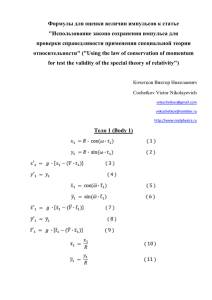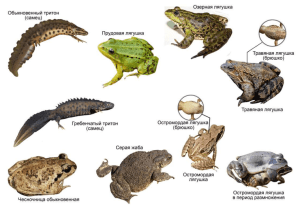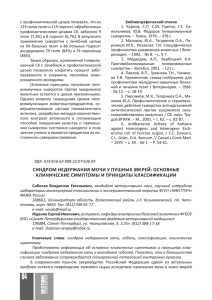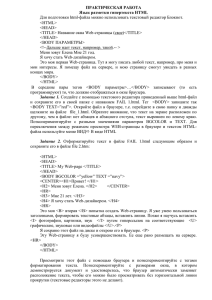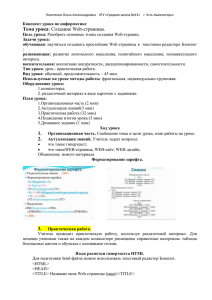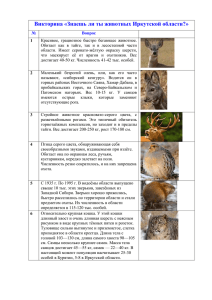Ящерица Прыткая2
реклама
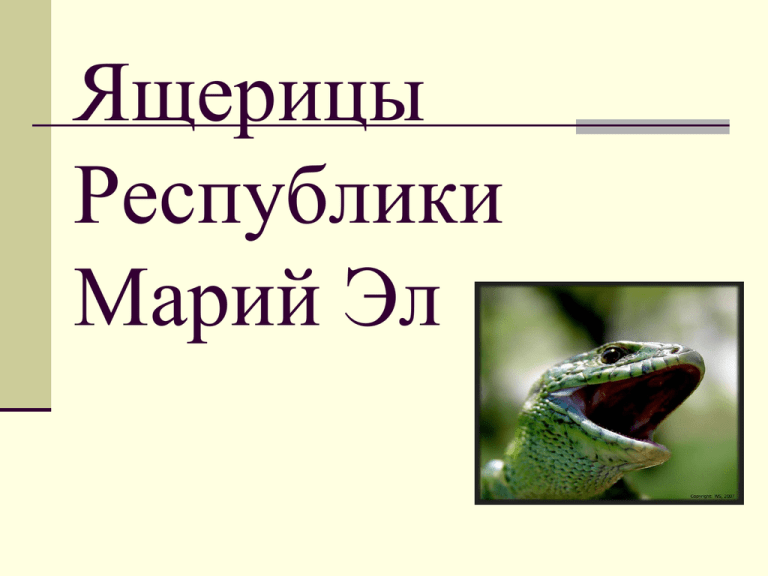
Ящерицы Республики Марий Эл The Lizards of the Mari El Republic Ящерица прыткая (Lacerta agilis) The sand lizard (Lacerta agilis) Размеры: Длина тела - 9-11.5 см; Длина тела с хвостом - 25-30 см. Sizes The length of the body is about 9 to 11,5 cm; The length of the body with the tail is about 25 to 30 cm. Описание Спинная чешуя узкая, с хорошо выраженными ребрышками; Окраска и рисунок изменчивы. The description The dorsal scales are narrow, with distinct keels; The dorsal coloration pattern is variable. Биотоп Прыткая ящерица населяет лесную, лесостепную и степную зоны; Селится в сухих биотопах, в том числе и синантропных; на юге ареала - в более влажных местах. Biotope The sand lizard occurs in forests, steppe-forests, and steppe zones They have a preference for dry places in the north, and in the south they seem to prefer humid places Образ жизни Активность дневная; Зимовка длится с конца сентября - октября до марта – мая. Ящерицы впадают в оцепенение при температуре +7,5° С; Спаривание начинается вскоре после выхода из зимовки; Живут до 5-6 лет. Habit of life Active during daytime (diurnal) Hibernation lasts from October till April. They become inactive at 7,5º C Mating starts soon after the end of hibernation They live for 5 or 6 years Схватка между самцами The fight between males Различие полов Самцы более мощные и ярче окрашены, брюхо взрослых самцов желто-зеленое; В период размножения бока головы, горло и края брюха у самцов становятся голубовато-синими, а туловище – яркозеленым. Самец Sex differences Males are stronger and brighter, the belly of an adult male ranges from yellow to green During the breeding season the sides of the head, the throat, and the edges of the belly turns light to dark blue, and the body becomes bright green. Male Самка Тело самок – желтоватое или белое. Они всегда остаются коричневатосерыми или бурыми. Female The ventral side of the female is yellowish or white. The dorsal coloring is always brownish to grayish. Веретеница ломкая (Anguis fragilis) (Anguis fragilis) Anguine lizard or slow worm (Anguis fragilis) Размеры: Общая длина – 40-45, до 50 см; Длина тела – 2325, до 29 см. Sizes The length of the body is about 23 to 29 cm The length of the body with the tail is about 40 to 50 cm Биотоп Смешанные и широколиственные леса и редколесье, окраины полей и лугов; Склоны с кустарниковой растительностью и лесами; Поймы и долины рек и ручьев, лесные просеки, вырубки, насыпи у проселочных дорог, овраги, окраины поселков и городов, сады и огороды. Biotope Mixed woods, broad-leaved woodlands, disturbed woods, and the edges of fields and meadows Slopes with bushes and woods River valleys, cleared areas, mowed fields, road-sides, hills, outskirts of settlements, towns, and gardens Образ жизни Ведет наземный образ жизни; Прячется в лесной подстилке, под упавшими стволами, в гнилых пнях; Использует норы грызунов и насекомоядных, валежник, груды камней; Способна неглубоко зарываться в рыхлую почву или песок, где и охотится. Habit of life Lives on the ground (terrestrial) Hides under the fallen leaves, tree stumps, leaf litter, and in rotten stumps Uses the holes of rodents and insectivores, stacks of hay, and rock piles Can burrow into soft soil or sand to hunt Различие полов По размеру самцы и самки принципиально не отличаются. У самцов хвост сравнительно более длинный, голова большая и более широкая, чем у самок . Для самцов характерно наличие двух рядов крупных голубых или черно-бурых пятен на спине, прежде всего в первой трети туловища. Самец Sexual Dimorphism Males and females do not differ in size. The tail of the male is longer, and the head is bigger and broader than that of the females. Male Самка У самок окраска менее яркая, брюхо однотонно черное, темное, по бокам черные, коричневые пятна или полоски. Female The colour of the females is duller The belly is black, or dark brown, and there are black and brown spots or stripes on both sides. Нежный поцелуй веретениц Tender kiss of the Anguine lizard Ящерица живородящая (Lacerta vivipara) The Viviparous lizard (Lacerta vivipara) Размеры Длина тела – 6,0-7,5 см; Длина тела с хвостом - 15-18 см. Sizes The length of the body is about 6,0 to 7,5 cm; The length of the body with the tail is about 15 to 18 cm. Биотоп В основном лесные и лесостепные биотопы, но на севере ареала заходит в зону тундры.Встречается в разреженных хвойных и лиственных лесах, в долинах рек и ручьев, в верховых и облесенных болотах, на вырубках, гарях, влажных пойменных лугах, по обочинам дорог, в садах и на огородах, по окраинам поселков и городов. Биотоп Biotope Basically in woods, disturbed woods, and steppes, but in the north they also inhabit the zone tundra zone. They can be found in coniferous and broad-leaved woods, in river valleys, in moors, clearings, burnt-out forests, in meadows, along road sides, and in gardens in the outskirts of settlements and towns Biotope Образ жизни Ведет наземный образ жизни; Активность дневная. В качестве укрытий использует норы грызунов, валежник, груды камней, старые пни, лесную подстилку, она влаголюбива и хорошо переносит низкие температуры; Живородящая ящерица хорошо плавает. Спасаясь от врагов, она может нырять, прятаться под камнями, закапываться в ил. Habit of life Lives on the ground Is active during the daytime Uses holes of rodents, hay, fallen leaves, tree stumps, leaf litter, rotten stumps, and rock piles to hide Prefers humid places and is adapted for low temperatures Swims very well Can dive, hide under stones, or burrow into silt to escape predators Различия полов брюхо у самцов оранжевое у самцов хвост утолщен у основания, они меньше самок и ярче окрашены. Брюхо, внутренняя поверхность бедер и основание хвоста у самцов кирпичнокрасные или оранжевые с темными пятнышками Самец Sex differences The belly, inner side of the hip, and the base of the tail of the males are brick-red or orange with dark spots, and the base of the tail is thickened It is smaller than the female, but has a brighter coloring Male Самка Брюхо у самок – желтоватое, кремовое, беловатое или зеленоватое, без пятен. Female The belly of the female is yellowish, creamy, whitish or greenish without spots. It does not lay eggs but gives birth to the young
